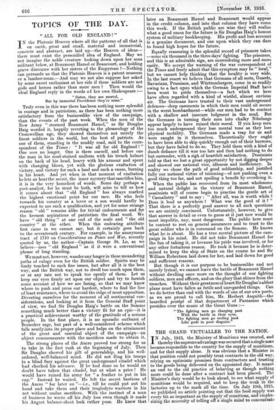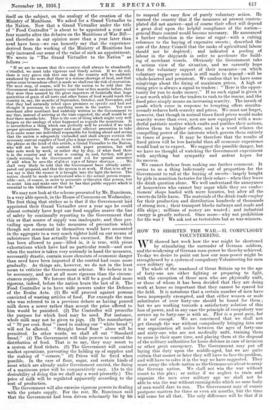THE GRAND VICTUALLER TO THE NATION.
IN Jul!, 1915, the Ministry of Munitions was created, and thereby the supreme advantage was secured that a single man became responsible to the country for the supply of munitions, and for that supply alone. It was obvious that a Minister in that position could not possibly treat contracts in the old way, relying on optimistic promises from contractors and trusting to the goods being delivered on the appointed day. It meant an end to the old practice of behaving as though nothing more could be done after a contract had been placed. The Minister's duty would be to look ahead, to see what supply of munitions would be required, and to keep the work in the factories up to the mark all the time. On July 10th, 1915, we published an article pointing out that the food supply was every bit as important as the supply of munitions, and emphasizing.the necessity of telling off a single mind to concentrate itself on the subject, on the analogy of the creation of the Ministry of Munitions. We asked for a Grand Victualler to the Nation. Now that a Grand Victualler under the title of "Food Controller" is about to be appointed a year and four months after the debates on the Munitions of War Bill— and therefore in our opinion more than a year later than need have been—we can honestly say that the experience derived from the working of the Ministry of Munitions has only increased our sense of the value of such an appointment. We wrote in "The Grand Victualler to the Nation" as follows :— "If we are to ensure that th's country shall always be abundantly v:ctualled, we mast take vigorous and timely action. If we do not, there is very grave risk that one day the country will be suddenly awakened by the news that there is a serious shortage of food, and that unless some tremendous effort is made we shall run the risk of starvation. The next step, of course, will be for the nation to be told that the Government made anxious inquiry some four or five months before, that they were then assured by the great importers of foodstuffs that huge quantities of grain of all sorts and other forms of food would reach this country in, say, the months of September, October, and November, and that they had naturally relied upon promises so specific and had not thought it necessary to do anything more in the matter. Yet now merchant after merchant had suddenly written to the Government to say that, instead of arriving at the time expected, the stuff would be at least three months late. That is the sort of thing which might very well happen on the analogy of what happened as regards the munitions. It is nevertheless a thing which can perfectly well be avoided if we take proper precautions. The proper and most efficient precaution to take is to make some one individual responsible for looking ahead and seeing that the nation is adequately victualled and shall always contain the necessary current supplies of food plus a large reserve. We want, to use the phrase at the head of this article, a Grand Victualler to the Nation, who will not be merely content with paper promises, but will take note week by week, or rather day by day, of what food there is in the country and of what is coming in, and, further, will give timely warning to the Government and ask for special measures if and when he sees the sl'ghtvst Litre of future shortage. . . . We *hall very likely be told that the Government have already anticipated our proposal, and that the system is at work. If that is so all we can say is that the sooner it is brought into the light the better. The nation should be made to understand who is the actual person responsible—not, of course, in order to persecute or threaten that person, but to assist him and make sure that he has that public support which is essential to the fulfilment of his task."
We may now look at the scheme presented by Mr. Runciman, in a very able speech, in the House of Commons on Wednesday. The first thing that strikes us is that if the Government had appointed their Grand Victualler over a year ago he could almost certainly have kept our food supplies nearer• the line of safety by continually reporting to the Government that this or that source of supply was inadequate, and thus prevailing upon them to take measures of precaution which though not sensational in themselves would have amounted in the aggregate to a very much tighter hold on our means of subsistence than has actually been exercised. But the time has been allowed to pass—filled in, it is true, with pious exhortations which have had no particular result—and now when the matter is taken very seriously in hand the measures, necessarily drastic, contain more elements of economic danger than need have been imported if the control had come more gradually. As things are, however, we do not in the least mean to criticize the Government scheme. We believe it to be necessary, and not at all more rigorous than the circumstances require. We foresee that it will be a good deal more rigorous, indeed, before the nation hears the last of it. The Food Controller is to have wide powers under the Defence of the Realm Acts. (1) He will proceed against persons convicted of wasting articles of food. For example the man who was referred to in a previous debate as having poured milk down a sewer rather than accept the price offered to him would be punished. (2) The Controller will prescribe the purpose for which food may be used. For instance, whole milk may not be given to pigs. (3) The manufacture of "70 per cent. flour" (used in making our "white bread ") will not be allowed. "Straight bread flour" alone will be permitted. In other words, we shall all eat "Standard bread." (4) The Government will take powers to control the distribution of food. That is to say, they may resort to a system of food tickets. (5) The Government will control market operations, preventing the holding up of supplies and the making Of "corners." (6) Prices will be fixed when possible. In the case of flour, sugar, and certain kinds of meat which are already under Government control, the fixing of a maximum price will be comparatively easy. (As to the desirability of doing this we shall say a word presently.) The price of milk will be regulated apparently according to the cost of production. The Government will also exercise rigorous powers in dealing with the potato supply. For the rest, Mr. Runciman said that the Government had been driven reluctantly bit by bit to suspend the easy flow of purely voluntary action. He warned the country that if the measures at present contemplated did not answer—and of course their effect will depend a great deal upon the helpful compliance of the nation— general State control would become necessary. He announced a further reduction in the issue of sugar—with a cutting reference to the buying of expensive sweets ; described the care of the Army Council that the ranks of agricultural labour should not be depleted ; and indicated a pooling of labour in the shipyards in order to accelerate the building of merchant vessels. Obviously the Government take a serious view of the situation, and we earnestly hope that the voluntarysupport of their measures—on which voluntary support so much is still made to depend—will be whole-hearted and persistent. We confess that we have some misgivings about the fixing of maximum prices. A high or rising price is always a signal to traders : "Here is the opportunity for you to make money." If no such signal is given it is not worth while for the traders to rush to the rescue, and the fixed price simply means an increasing scarcity. The inrush of goods which come in response to tempting offers simultaneously reduces both scarcity and prices. We must not forget, however, that though in normal times fixed prices would make scarcity worse than ever, men are now equipped with a wonderful patriotic motive which exalts and purifies their actions, drives them to higher efforts, and in a word relaxes the compelling power of the interests which govern them entirely in times of peace. It may be therefore that the results of fixed prices will be less harmful than all economic experience would lead us to expect. We suggest the possible danger, but we have no thought of watching the Government experiment with anything but sympathy and ardent hopes for its success.
We cannot forbear from making one further comment. It seems to us a thing ludicrously out of proportion for the Government to rail at the buying of sweets—largely bought by girls in munition factories for their solace—when they leave the drink question alone. We well understand the annoyance of housewives who cannot buy sugar while they see confectioners' shops loaded with mere luxuries, but after all the sweets do little harm. The materials of the drink trade employ for their production and distribution hundreds of thousands of strong men ; their transport blocks railways and roads and fills ships ; millions of money are wasted ; and industrial energy is greatly reduced. Once more—why not prohibition for the war 9 We ask not as teetotalers but as war-winners.













































 Previous page
Previous page